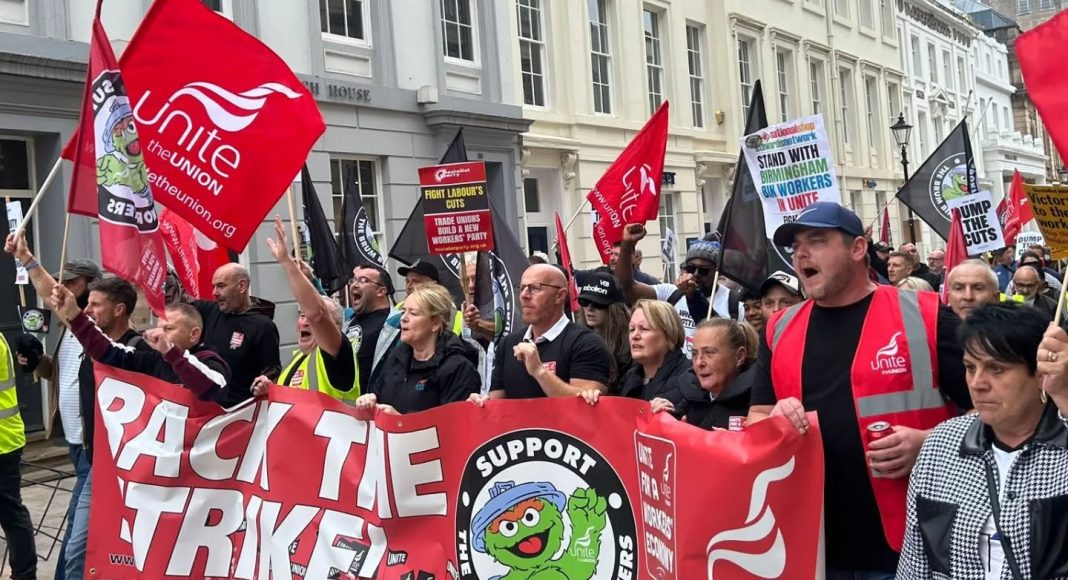Nearly a year into their strike, Birmingham bin workers’ livelihoods remain in a precarious position as residents are forced to live amid heaps of uncollected rubbish. The strike has recently seen three key developments: in September, strikers voted to extend the strike at least as long as March 2026; then, in October, Birmingham City Council (BCC) began prosecuting compulsory redundancies; finally, scab workers are themselves voting for strike action against BCC.
The strike began in January 2025 when Birmingham City Council (BCC) stated its intention to delete the role of ‘waste recycling and collection officer’ (WRCO). Workers were told they must take redundancy or, in the worst cases, a pay-cut of £8,000 – essentially a fire and rehire scheme, moving workers from a grade three to grade two paid position. In March, an all-out strike was called after councillors repeatedly refused to attend pay negotiations; instead of meeting the government commissioners – brought in by the then Conservative government to administer the council after it declared itself effectively bankrupt in July 2023 – union reps were allowed to meet only with powerless HR managers. At the same time, threats to dust-cart drivers’ pay also loomed. These fears were correct as dust-cart drivers also face role deletion under a similar fire and rehire scheme to WRCOs: that is, a nominal pay cut of £8,000 – albeit from grade four to grade three.
By September, it was confirmed that BCC had axed the WRCO position. Base strike pay for Unite is reportedly £70 a day, although drivers are able to claim a little more. This means that strikers have been living less than minimum wage for nine months, only to find that their jobs have not been saved and they have no option but to accept the pitifully low redundancy deal offered by BCC.
While Unite has not published the details of any pay-outs, ex-WRCO workers report that the council has offered them a week’s pay for every year that they have been employed. At best, that entitles a worker to approximately £770 for every year worked. Initially, workers pushed for a month’s pay per year but this was vetoed by central government. This deal is made worse however by the fact that regardless of how long a worker has been on grade three pay, their employment record will reflect at most eight years on their current contract. This is because the WRCO position did not exist until 2017. The WRCO position was created after the 2017 bin strike when BCC axed the grade three ‘leading hands’ role. After the 2017 strike, leading hand workers were rehired under a new contract as WRCOs. Therefore, anyone who has worked for more than eight years on grade three pay will have their number of service years deflated on a technicality, entitling them to less redundancy pay. That is before taking into account that all workers will effectively lose a year’s service owing to the strike.
Whilst some 100 drivers have taken redundancy, other workers have declined and instead have responded to payout deals by voting to extend the strike at least until March 2026. Workers were unbowed by the prospect of another winter on strike pay.
In October, John Cotton, the leader of the Labour-run BCC, claimed that the council had offered ‘everything they reasonably could to resolve the dispute’ and that BCC will now pursue involuntary redundancies.
Throughout the strike BCC has relied heavily on scab workers to conduct rubbish collections. As a result of poor training and lack of experience there have been reports of numerous incidents. Residents have had their houses crashed into – incurring hundreds of thousands of pounds spent on compensation – and in some cases have been nearly killed by negligent, inept drivers at the wheels of fourteen ton dustcarts. Safety concerns notwithstanding, in October, agency workers began to refuse to cross picket lines. Workers from the Job & Talent agency have cited ‘unsustainable workloads’ and a culture of bullying at BCC’s refuse department. An investigation into workers’ claims found no such culture existed but this is clearly not the case as conditions are so bad that Unite – which also represents agency staff – has opened a strike ballot for workers originally brought in to cover for a striking workforce. The council may turn to other agency workers should the ballot entail strike action but in the meantime rubbish continues to pile up.
Overall, the situation in Birmingham encapsulates the crisis engulfing the working class in Britain. The ruling class is not willing to pay for public services of benefit to the working class as a whole. Indeed, the middle classes in Birmingham are paying for private bin collection whilst the poorest and most ethnically diverse areas of the city – like Handsworth, Small Heath, Lozells to name a few – have no alternative. Some residents who require step-free access are trapped in their own homes as they are denied mobility by pavements blocked by heaps of rotting refuse. Their misery can be laid directly at the feet of Labour-run BCC. As with housing and healthcare cuts nationwide it is the working masses who are paying for British capitalism in decay.
Victory to the strikers!
Reuben Birch




